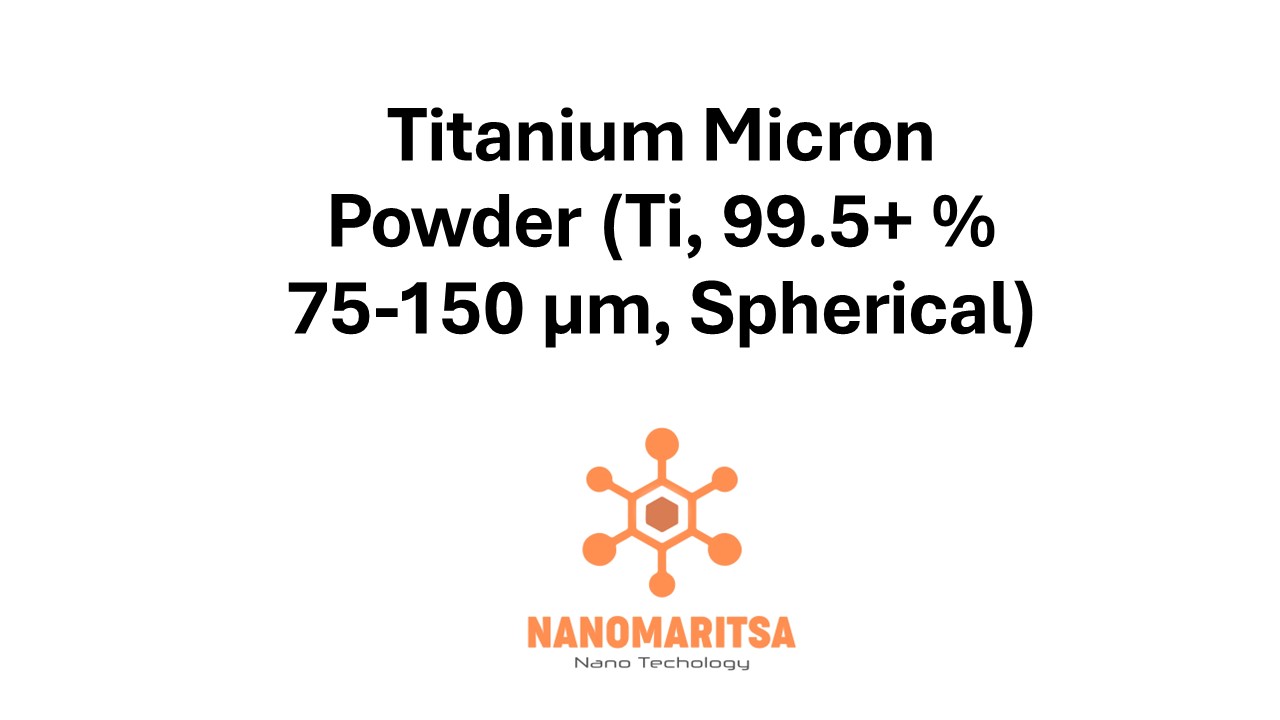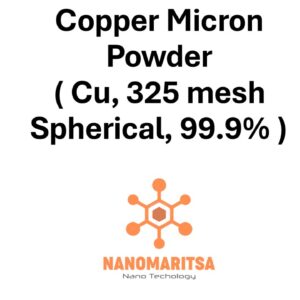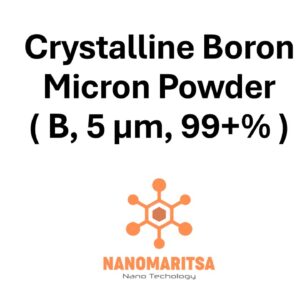Titanium Titanium Micron Powder ( Ti, 99.5+ %,75-150 µm, Spherical )
€112.00
CompareTitanium Micron Powder (Ti, 99.5+%, 75–150 µm, Spherical) is a high-purity titanium powder distinguished by its spherical particle morphology and a relatively larger particle size distribution ranging from 75 to 150 micrometers. This size range balances robust flow characteristics with significant bulk density, making the powder well suited for traditional powder metallurgy, coatings, and certain additive manufacturing techniques that require coarser powder grades. Titanium’s renowned combination of light weight, high strength, corrosion resistance, and biocompatibility ensures its continued adoption across aerospace, automotive, medical, and industrial sectors.
- Key Properties
- High Purity (≥99.5%)
Maintaining such a purity level is essential for critical applications in aerospace, medical, and industrial environments, where contaminants could compromise mechanical or chemical performance. - Spherical Particle Shape
The round geometry of each particle improves packing density and flowability, facilitating consistent feeding in powder-based processes like thermal spraying or large-format additive manufacturing. - Particle Size (75–150 µm)
A coarser size spectrum provides excellent flow while minimizing dust formation, reducing handling challenges and improving overall safety during manufacturing. - Corrosion Resistance
Titanium’s natural oxide film resists chemical attack, extending the service life of parts exposed to harsh or high-temperature environments. - High Strength-to-Weight Ratio
Titanium delivers impressive mechanical strength with a relatively low density, vital for weight-sensitive industries seeking enhanced performance without additional mass. - Biocompatibility
The inert, non-toxic nature of titanium makes it safe for implantation in the human body, exemplified by its use in orthopedic and dental devices.
- High Purity (≥99.5%)
- Applications
- Aerospace & Automotive
Coarse spherical titanium powder can be used for larger structural parts, engine components, and thermal barrier coatings, capitalizing on its favorable strength-to-weight ratio. - Thermal Spraying
The 75–150 µm range is particularly advantageous for thermal spray processes (e.g., plasma spray) that deposit corrosion- and wear-resistant titanium layers on critical components. - Powder Metallurgy
Press-and-sinter or hot isostatic pressing (HIP) methods benefit from the powder’s uniform shape and stable flow, producing near-net-shape parts with minimal wastage. - Additive Manufacturing (3D Printing)
While fine powders are typically preferred for precision AM processes, larger-particle titanium powders can be used in certain types of machines or applications requiring thicker layers. - Medical & Industrial Equipment
In applications where mechanical strength and corrosion resistance are crucial—such as surgical tools or chemical processing components—coarse titanium powder delivers reliable performance.
- Aerospace & Automotive
- Advantages
- Improved Flow & Reduced Dust
Larger, spherical particles flow smoothly through hoppers, reducing clogging and equipment wear, and produce less airborne particulate, improving operational safety. - Extended Wear Life
High-strength titanium components exhibit durability in extreme conditions, reducing downtime and maintenance costs in heavy-duty and high-temperature applications. - Corrosion & Oxidation Resistance
Titanium’s surface oxide layer protects against rust and chemical corrosion, enabling longer part lifetimes in marine, chemical, or high-heat environments. - Enhanced Design Flexibility
From thermal spraying to near-net-shape pressing, coarse titanium powder adapts to a variety of manufacturing processes, allowing designers to optimize parts for performance. - Lightweight & Biocompatible
Ideal for improving fuel efficiency in transportation industries and ensuring patient safety in medical applications, where the metal’s low density and tissue compatibility are key.
- Improved Flow & Reduced Dust
- Recent Trends and Research
- Large-Scale 3D Printing
Researchers are experimenting with broader layer thicknesses and novel print head designs that accommodate coarser titanium powders for faster build rates. - Advanced Coatings
Hybrid processes that combine thermal spray methods with laser or electron-beam technology are under development, enhancing titanium coating adhesion and uniformity. - New Alloy Formulations
Alloying titanium with elements like aluminum and vanadium continues to refine mechanical and thermal properties, expanding use cases for specialized industrial parts. - Resource Efficiency
Companies focus on recycling titanium scrap and unused powders, aiming to reduce material costs and environmental impact while maintaining product quality. - Medical Innovations
Titanium’s biocompatibility and structural strength fuel ongoing research into custom implants and bone scaffolds using coarser powders for faster production cycles.
- Large-Scale 3D Printing
- Future Prospects
- Aerospace & Defense Growth
As pressure mounts to develop lighter yet strong aircraft components, titanium powder stands to play an increasing role in turbine blades, structural parts, and protective coatings. - Expanded Industrial Machinery Applications
The need for durable, corrosion-resistant machinery in chemical processing, power generation, and maritime operations will propel the use of coarser titanium powders. - Enlarged Additive Manufacturing Portfolio
Continued improvements in machinery capable of handling coarser powders could open the door to building larger-scale titanium parts with fewer manufacturing steps. - Sustainability & Cost Reductions
Greater emphasis on recycling and process optimization is likely to lower the overall cost of titanium powder products, encouraging broader adoption in diverse sectors. - Innovative Biocompatible Solutions
As medical technology advances, titanium’s inert, robust character will inspire further expansion into personalized implants, prosthetics, and advanced surgical tools.
- Aerospace & Defense Growth
The combination of spherical morphology, 75–150 µm particle size, and 99.5+% purity positions Titanium Micron Powder (Ti, 99.5+%, 75–150 µm, Spherical) as a versatile choice for industries that require strong, corrosion-resistant, and flow-friendly materials. Whether used in aerospace, automotive engineering, medical devices, or large-format additive manufacturing, this coarse titanium powder meets the rigorous demands of modern manufacturing while offering the well-known performance benefits that titanium is celebrated for worldwide.
| Measurement (gr) | 100 grams, 500 grams, 1000 grams |
|---|






